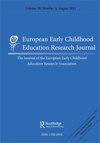玩耍是幼儿园儿童亲社会技能和入学准备的先行因素
IF 1.4
4区 教育学
Q2 EDUCATION & EDUCATIONAL RESEARCH
European Early Childhood Education Research Journal
Pub Date : 2023-04-13
DOI:10.1080/1350293X.2023.2200018
引用次数: 0
摘要
摘要本研究调查了香港幼儿园儿童在不同时期的游戏性、亲社会技能和入学准备之间的相互关系。参与者为106名当地儿童(55.6%为男孩,平均年龄 = 60.0个月)及其父母和老师。在时间1,父母报告他们的孩子的年龄,性别和嬉戏。六个月后,在时间2,老师们报告了孩子们的亲社会技能和入学准备情况。结构方程模型显示,儿童在时间1时的游戏性显著预测了他们在时间2时的亲社会技能,并且他们的亲社会能力和在时间2的入学准备程度呈正相关。通过亲社会技能介导的游戏性和入学准备之间的间接关系是显著的,而直接关系是不显著的。这些发现表明,儿童的游戏性可能通过培养亲社会技能来促进入学准备。实际上,研究结果强调了促进儿童的游戏性和亲社会技能以支持他们正式的学校过渡的效用。本文章由计算机程序翻译,如有差异,请以英文原文为准。
Playfulness as the antecedent of kindergarten children’s prosocial skills and school readiness
ABSTRACT This study examined the interrelationships among playfulness, prosocial skills, and school readiness of Hong Kong kindergarten children across time. Participants were 106 local children (55.6% boys, mean age = 60.0 months) and their parents and teachers. At time 1, parents reported their child’s age, gender, and playfulness. Six months later at time 2, teachers reported children’s prosocial skills and school readiness. The structural equation model revealed that children’s playfulness at time 1 significantly predicted their prosocial skills at time 2, and that their prosocial skills and school readiness at time 2 were positively associated. The indirect relationship between playfulness and school readiness as mediated through prosocial skills was significant, whereas the direct relationship was non-significant. These findings suggest that children’s playfulness may contribute to school readiness by fostering prosocial skills. Practically, results highlight the utility of promoting children’s playfulness and prosocial skills to support their formal school transition.
求助全文
通过发布文献求助,成功后即可免费获取论文全文。
去求助
来源期刊

European Early Childhood Education Research Journal
EDUCATION & EDUCATIONAL RESEARCH-
CiteScore
4.20
自引率
8.70%
发文量
70
期刊介绍:
The European Early Childhood Education Research Journal (EECERJ) is the publication of the European Early Childhood Education Research Association (EECERA), an international organisation dedicated to the promotion and dissemination of research in Early Childhood Education throughout Europe and beyond. CREC is the UK base for the European Early Childhood Research Association. EECERA welcomes and encourages membership and contributions from across the world to share and participate in its European perspective. EECERJ aims to provide a forum for the publication of original research in early childhood education in Europe.
 求助内容:
求助内容: 应助结果提醒方式:
应助结果提醒方式:


